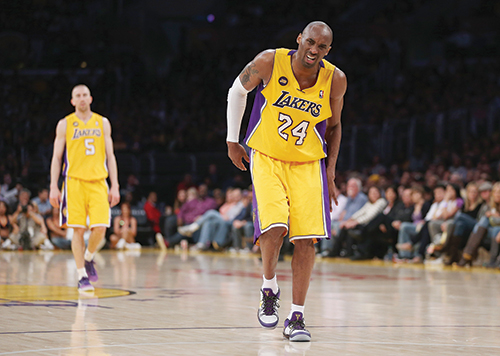
This could be the perfect way for the final chapter of Kobe Bryant’s career to unfold.
In light of the Achilles injury that will sideline Bryant for the next six to nine months, I’m sure he and most of his die-hard fans would disagree. They likely view it as a tragedy, a final insult at the end of a long, bitter season, and a yanking of the rug out from underneath one of the greatest careers in sports history.
I can understand that point of view. I love Kobe’s game, and I’ve rooted for him nearly his entire career. I’m disappointed that I won’t get to see him in the playoffs this year, and it’s almost sad to be reminded that his playing days are coming to a close, injury or not.
Almost sad, but not quite. Even though I love his game, it’s incredibly hard to feel anything but cold admiration for Kobe Bean Bryant. His greatness is defined by an intensity that is entirely devoid of emotion, and so, in his darkest days, it’s a struggle to muster the depth of feeling that seems logically appropriate.
Bryant’s machine-like resistance to human empathy—and his refusal to extend it to others—has been the defining feature of his persona for each of his 17 professional seasons. Because this facet has been so carefully and thoroughly curated over the years, it has become essentially the only prism through which to view him. It’s inherently divisive; in Kobe, you either see a purity of righteous intention or a sneering sociopath.
He is acutely aware of this public perception, as all cultivators of distinct personalities are, but he is only concerned with it insofar as it reflects the path he has chosen for himself. He neither defines himself as a big-hearted, selfless teammate nor cares if anyone else does. His personality is geared to reflect indomitable will, unvarnished competitiveness, and the uncompromising pursuit of victory. And I believe it derives from something honest. Those are the values that resonate most strongly with Kobe, and I think he sees it as a betrayal of his talent to bury them just to be liked. All public figures have choices when it comes to how they portray themselves; Kobe has simply been great enough for those choices to matter.
And though for many Kobe represents a vision of humanity too ugly to defend, it is impossible to deny the tangible on-court effects of his choices. For Bryant, all the criticism of his conduct is trumped by results. He is a five-time NBA champion, a 15-time All-Star, a first-ballot Hall of Famer, and he just turned in perhaps his most remarkable, efficient season after nearly two decades in the league. And not only would Kobe point to his tireless work ethic, sadomasochistic ability to play through pain and shark-like single-mindedness as the reasons for his success, he would insist that you do the same.
Kobe understands how the history books are written. He doesn’t want to be loved for who he is. He wants to be revered for what he has done and the very specific way he has done it.
Which is why this injury is such a fitting way for the curtains to begin to close on Kobe’s remarkable career. It was unlikely that his career was going to end in a championship, because so few do and because he would view winning as proof that he could keep going. But while he’s not likely to go out on top, he can still go out on his own terms. Kobe’s greatness is defined by his sheer force of will, and w hat better way to assert that greatness one last time than to overcome this terrible injury. He will be back. He will quietly and icily show us what a devotion to winning above all else means when you follow it to its logical, lonely conclusion.
We won’t love him for it, and when he does finally go we won’t really be sad. He hasn’t given us that option. But the results will speak for themselves, and we will respect him.

